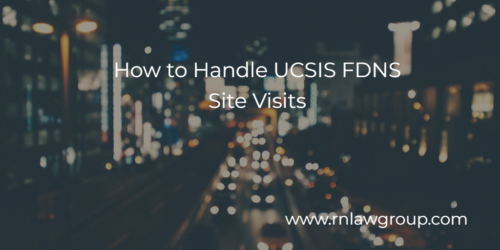
How to Handle UCSIS FDNS Site Visits
Post the major part of the COVID-19 pandemic, there has been in increase in USCIS Fraud Detection and National Security Directorate (FDNS) site visits. These site visits can take the form of calls, in-person visits, or emails where the officer demands certain information in usually one to two business days. These visits are unannounced, and can be at the end-client site, the petitioner’s office, or if the LCA includes a work from home option, at the Beneficiary’s home. While these may same scary, there are ways to better prepare for them and better ways on how to handle them, or, as this article will discuss, tell FDNS you are not participating.
First, if you or your company are represented by an attorney, contact your attorney to assist you with the site visit. You are not alone in these site visits, and the attorney can still assist or play the role of liaison. When you get these site visits so you can before responding to the officer, be sure you do a review of the petition and your responses before sending your response. Often times people panic with these visits and respond haphazardly causing issues between the petition and the responses that can lead to revocation. When responding, be sure to respond truthfully as these officers are trained to spot lies and that can create more problems in the future.
Unfortunately, often times the requests from these officers go well beyond the scope of a single H-1B, the statutory or regulatory requirements of the H-1B program, and are more or less a fishing expedition against the company to get as much information into the FDNS database as possible. FDNS will request things like a list of all employees, their contact information, and their immigration status or they will request pay statements from all employees. They put pressure on companies and beneficiaries to illicit a response. Keep in mind these responses go into their system and we have seen instances where FDNS responses are used at the green card stage as well as the H-1B stage.
It is important to keep in mind that participation in certain FDNS site visits is completely voluntary. The Administrative Site Visit and Verification Program (ASVVP) website specifically states as such. See https://www.uscis.gov/about-us/directorates-and-program-offices/fraud-detection-and-national-security/administrative-site-visit-and-verification-program (last visited Sept. 19, 2022). Often times, companies are too busy to respond to these officers in the quick turnaround, or do not want to provide answers to the frivolous fishing expedition requests that the FDNS officers are requesting. As noted on the ASVVP website, participation is voluntary, and if you decline to participate, the officer should conclude the review using the information provided and document the circumstances around the ending of the site visit. When declining to participate FDNS officer will utilize a bag of tricks to attempt to persuade you to respond. Just politely remind them that their rules say it is voluntary. It helps when declining if you have an attorney doing the response instead of you as a company or beneficiary. In rare circumstances, FDNS has sent administrative “subpoenas” for non-compliance with a site visit. This is something our firm’s litigation team has gone through and think can be fought in federal court should FDNS seek to enforce the subpoena. In order to enforce an administrative subpoena, they would have to bring a case in federal court to enforce it. Given the fact that the ASVVP is voluntary, it seems unlikely that USCIS has a good statutory or regulatory argument for enforcing a subpoena. Generally speaking, the worst result from a site visit is a notice of intent to deny, if the application is still pending, or a notice of intent to revoke, if it is approved. Both can be responded to if you declined to participate and they are using that against you.
FDNS site visits are designed to be stressful. The officers are trained to elicit a response and tend to utilize pressure to get it. USCIS does review FDNS officer reports in order to take immigration action either now or in the future. It is important to properly respond, or as we have seen success with, decline to participate in a voluntary program that is asking for a laundry list of items. Either way, when dealing with FDNS, it is important to talk to a qualified immigration attorney that has experience in dealing with FDNS issues prior to responding.
By: Steven Brown
Steven Brown is a Partner at Reddy Neumann Brown PC where he works in the Non-immigrant visa department and leads the Litigation Team. His practice covers all phases of the non-immigration visa process including filing H-1B, L-1, E-3, H-4, and H-4 EAD petitions. In the last two years, Steven has successfully handled over 1,000 non-immigrant visa petitions including filing petitions, responding to any necessary Requests for Evidence, and drafting motions and appeals. He has also become a key resource for F-1 students that seek guidance on properly complying with the F-1 visa regulations and any OPT or CPT issues they may have. Additionally, Steven holds a weekly conference call for companies that are part of one of the largest organizations for IT Services companies in America.
Reddy & Neumann has been serving the business community for over 20 years and is Houston’s largest immigration law firm focused solely on US. Employment-based immigration. We work with both employers and their employees, helping them navigate the immigration process quickly and cost-effectively

